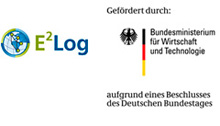With regard to climate protection, security of energy supply and competitiveness, energy efficiency in industry plays a key role. Further to production technologies deployed, energy consumption in the manufacturing sector is determined by the entire production system including subsystems like logistics. Logistics concepts may incur repercussions on energy efficiency in internal and external logistics, warehousing and manufacturing via e.g. lot sizes and frequencies of deliveries. Therefore, besides energy-efficient production techniques, such interactions may be important levers for increasing systemic energy efficiency of production networks.
Further to traditional objectives for production and logistics systems, E²Log is designed to achieve systemic increases in energy efficiency in overall production systems of supply chains. The main task of the project is to develop methods and tools that allow assessing and designing the production environment towards system-wide increases in energy efficiency.
In order to achieve this, data on energy consumption in logistics and production will be collected. The data will be made available for planning purposes based on dynamic simulation models. This forms the basis for the derivation of design recommendations to supply chain partners to improve system-wide energy efficiency in production and logistics networks. It will allow production networks and involved manufacturing companies and logistics-service providers to:
- Analyse the state of individual companies and production networks regarding energy and economic efficiency;
- Simulate the effects of changes in production networks in terms of energy efficiency; and
- Assess challenges for production networks resulting from changes in energy markets.
In this regard the Wuppertal Institute analyses the relationship between value added, logistics design options and energy consumption. The main drivers of energy consumption and efficiency as well as options for optimising production and logistics will be identified and assessed. Further to this the Wuppertal Institute will be involved with one of the partners from industry and the platform for small and medium sized companies (SME).

